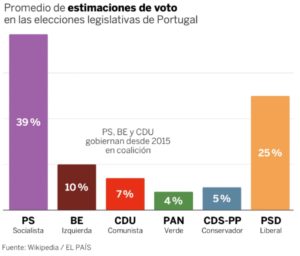‘There is no planet B’
 Portugal prepares to vote in Sunday’s general election.
Portugal prepares to vote in Sunday’s general election.
With thousands of youngsters filling the streets at Lisbon’s Global Climate strike, one wonders how ‘green’ in fact its political parties are?
The centre-right Social Democrat party (PSD) recognizes ‘the state of emergency the planet is in’ but only presents measures enhancing the country’s ‘adaptation to climate change’ by limiting urban expansion in risk zones and favouring garden roofs. The PSD argues the energy sector to adapt but doesn’t specify how.
 For the ruling Socialist party (PS) climate change adaptation is also needed. But that isn’t enough. The party defines concrete targets for 2030 and others for 2050, such as carbon neutrality. The PS wishes to reinforce the capacity of wind farms and – faced with extreme weather – extend forecasting and warning systems. Empowering farmers ‘to adopt good practices’ is also called for.
For the ruling Socialist party (PS) climate change adaptation is also needed. But that isn’t enough. The party defines concrete targets for 2030 and others for 2050, such as carbon neutrality. The PS wishes to reinforce the capacity of wind farms and – faced with extreme weather – extend forecasting and warning systems. Empowering farmers ‘to adopt good practices’ is also called for.
 The Left Bloc (BE) is in favour of a Climate Law, an Energy Base Law and a Ministry of Climate Action. The far-left party advocates the end of fossil fuel car production by 2025 and coal-fired power generation by 2023, in the meantime accelerating solar production. It also intends to ban cars from city centres and strives for free public transport, favouring investment in ‘rail mode’.
The Left Bloc (BE) is in favour of a Climate Law, an Energy Base Law and a Ministry of Climate Action. The far-left party advocates the end of fossil fuel car production by 2025 and coal-fired power generation by 2023, in the meantime accelerating solar production. It also intends to ban cars from city centres and strives for free public transport, favouring investment in ‘rail mode’.
The Unitary Democratic Coalition (CDU) – an electoral coalition between Communists and ecologist Greens – rejects green taxation, the concept of user pays and CO2 licensing. Instead, the railway network should be modernized with ‘high-speed connections’ from Lisbon to Porto and the Spanish border. It also advocates a Forest Policy based on traditional ecosystems.
 The millennium Animal and Nature party (PAN) – founded in 2009 – wants vegetarian meals at state-sponsored events, prevention of any exploitation of hydrocarbons and the closure of all coal plants by 2023. Furthermore financial benefits for cycling to work, measures to reduce car traffic, restrictions on night air traffic and the suspension of the construction of a new airport.
The millennium Animal and Nature party (PAN) – founded in 2009 – wants vegetarian meals at state-sponsored events, prevention of any exploitation of hydrocarbons and the closure of all coal plants by 2023. Furthermore financial benefits for cycling to work, measures to reduce car traffic, restrictions on night air traffic and the suspension of the construction of a new airport.
For the rightwing Christen Democrats (CDS) a Climate Law for carbon neutrality is warranted. The party wishes to materialize an energy transition with transparency in the energy market’. Other objectives include ‘green’ entrepreneurship, full electrification and expansion of the railways.
 However, the level of commitment of all six major parties is far too low, argues a group of independent citizens, analysing the elections programs. None of the parties mentions sufficient steps to reach the 96 goals (metas) defined in the Roadmap to Carbon Neutrality.
However, the level of commitment of all six major parties is far too low, argues a group of independent citizens, analysing the elections programs. None of the parties mentions sufficient steps to reach the 96 goals (metas) defined in the Roadmap to Carbon Neutrality.
The PS – with 40 targets – comes first, which is not surprising given that the Roadmap is an initiative of the current socialist government. The CDU closes the peloton with only 13 targets covered. PAN proposes the most CO2 reduction measures and BE is the party that most concretises the actions to achieve carbon neutrality.
 The polls suggest António Costa’s Socialist party will win but fall short of an absolute majority in parliament.
The polls suggest António Costa’s Socialist party will win but fall short of an absolute majority in parliament.
If the climate were to choose, it would be a coalition of the Socialist party and the Left Bloc or the PAN- which is less ideologically fixed.
Bom fim de semana Enjoy your weekend (pic. Público/Sapo)
